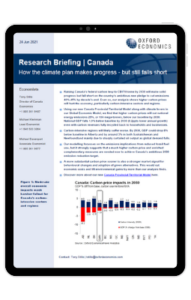Canada | How the climate plan makes progress – but still falls short

Raising Canada’s federal carbon levy to C$170/tonne by 2030 will make solid progress but fall short on the country’s ambitious new pledge to cut emissions 40%-45% by decade’s end. Even so, our analysis shows higher carbon prices will hurt the economy, particularly carbon-intensive sectors and regions.
What you will learn:
- Using our new Canada Provincial Territorial Model along with climate levers in our Global Economic Model, we find that higher carbon prices will cut national energy emissions 25%, or 136 mega-tonnes, below our baseline by 2030.
- Carbon-intensive regions will likely suffer worse. By 2030, GDP could drop 8% below baseline in Alberta and by around 3% in both Saskatchewan and Newfoundland mainly due to sharply curtailed oil output as global demand falls.
- Our modelling focusses on the emissions implications from reduced fossil fuel use, but it strongly suggests that a much higher carbon price and enriched complementary measures are needed now to achieve Canada’s ambitious 2030 emission reduction target.
Tags:
Related Services

Post
Food prices to bottom out in 2024, risks skewed to upside
Our baseline forecast is for world food commodity prices to register an annual decline this year, in aggregate, reducing pressure on food retail prices further downstream. However, we believe the risks to this forecast are overwhelmingly skewed to the upside.
Find Out More
Post
Battery raw material prices to recover
Battery raw materials prices bottomed out last quarter and we think a sustained recovery is looming. Midstream EV battery manufacturing activity has picked up again and inventories have returned to historical levels, suggesting upstream demand for raw materials will also bounce back.
Find Out More